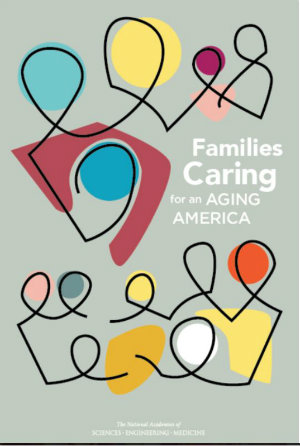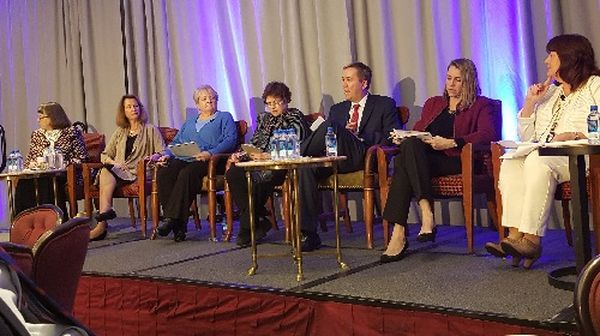This month began with an AARP Solutions Forum on the landmark Families Caring for an Aging America report that brought out big, bold ideas about how to elevate the role of family caregivers in our health care system.
A diverse range of leaders and audience participants explored opportunities to advance support, skills, and training for family caregivers, and examined what the landscape looks like going forward. All present agreed that the report, released in September by an expert committee convened by the prestigious National Academies of Sciences, Engineering and Medicine, marked an important new opportunity to create real health systems change to support family members taking care of older loved ones.
We’re grateful to our partner, AARP, for bringing leaders in the field together to talk about how to make that opportunity a reality.
The forum kicked off with opening remarks by our good friend and colleague, Susan Reinhard, who leads the AARP’s Public Policy Institute. Previously the deputy commissioner at the New Jersey Department of Health and Senior Services, Susan has a history of success in helping change policy at the federal and state levels to support family caregivers. It’s exciting for all of us to know we have a real champion and doer when it comes to this work!
The day-to-day realities and challenges family caregivers experience were brought home in powerful testimony by Rita Choula, who works with Susan on AARP policy initiatives and has lived the life of a family caregiver for both her grandmother and mother—all while raising children of her own. Rita has done important work at AARP focused on providing training and guidance to health care professionals and family caregivers, particularly with a multicultural perspective. Her moving story helps us all understand how heavy the burden of caring for a loved one can feel.
 Following a powerful keynote address by Richard Schulz, Chairman of the National Academies’ Committee on Family Caregiving for Older Adults, Lynn Friss Feinberg of AARP’s Public Policy Institute moderated a session designed to arrive at what a transformed health care system that provides enhanced support to family caregivers would ultimately look like. Leading experts on aging came together offering new ideas and insights, including Maria Aranda of the University of Southern California, Georgetown University’s Judy Feder, and Johns Hopkins University leaders Laura Gitlin of the Roger C. Lipitz Center for Innovative Care in Aging and Jennifer Wolff of the Bloomberg School of Public Health.
Following a powerful keynote address by Richard Schulz, Chairman of the National Academies’ Committee on Family Caregiving for Older Adults, Lynn Friss Feinberg of AARP’s Public Policy Institute moderated a session designed to arrive at what a transformed health care system that provides enhanced support to family caregivers would ultimately look like. Leading experts on aging came together offering new ideas and insights, including Maria Aranda of the University of Southern California, Georgetown University’s Judy Feder, and Johns Hopkins University leaders Laura Gitlin of the Roger C. Lipitz Center for Innovative Care in Aging and Jennifer Wolff of the Bloomberg School of Public Health.
I had the privilege of taking part in a second panel that tackled the topic of what concrete action steps those of us in the field can take to ensure that the family caregiving report recommendations are enacted. The panel featured the nation's premier leaders in the movement for improving caregiving for older adults, including Drew Holzapfel who leads ReACT, a business coalition seeking to address the impact of caregiving on their employees; Gail Hunt who heads up the National Alliance for Caregiving; Kathy Kelly, the longtime executive director of the Family Caregiver Alliance; Mary Ellen Kullman of the Archstone Foundation, a co-funder of the report with The John A. Hartford Foundation; and Joanne Lynn of the Altarum Institute’s Center for Elder Care and Advanced Illness.
I reemphasized that care must be not only person-centered, but family-centered and that caregiver support is a team effort. There are proven, evidence-based programs to help family caregivers. I also noted that The John A. Hartford Foundation is dedicated to recognizing and incorporating the many levels of diversity in caregiving, including cultural, economic, and racial differences.
Part of our discussion focused on what we all can do to move the family caregiving agenda forward. The John A. Hartford Foundation intends to use the report to guide our grantmaking in Family Caregiving, one of our three priority areas. And the Foundation’s collaborative approach will facilitate working with other funders and key stakeholders, grantees, and federal and other public entities, including the Veterans Administration, to improve family caregiver supports.
As an example, I shared that our Foundation took the lead to pull together a group of funders with an interest in family caregiving to foster the sharing of information and best practices, avoid reinventing the wheel, and offer an open and supportive place for funders to explore ideas and programs together.
The AARP event closed with a motivating message from Susan Reinhard to keep the ball moving forward. It was a day of promise and hope for giving family caregivers—who do their jobs day in and day out to care for the people they love the most—the help and support they so desperately need.

